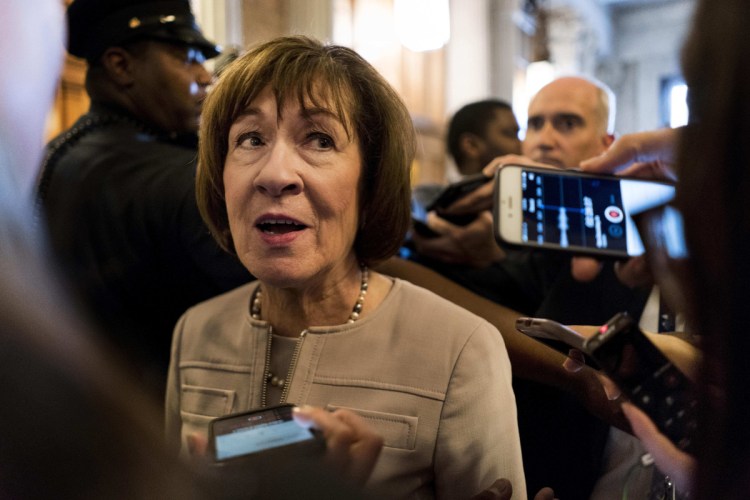Maine’s Sen. Susan Collins did more than announce that she would vote to elevate Judge Brett Kavanaugh to the Supreme Court on Friday. She also tied her reputation to his for as long as he serves on the bench.
If Kavanaugh joins a five-member bloc of Republican judges that makes it more difficult for women to get an abortion, or interferes with the Environmental Protection Agency’s ability to control air pollution that comes to Maine from the Midwest, or protects President Trump from legal action, Collins will own a share of the blame.
And it should also be part of her legacy if more evidence emerges to support the charges of sexual misconduct that have been made against the judge. Without the benefit of a real investigation, Collins decided that he deserved a lifetime appointment to the Supreme Court unless the charges against him could be proven up to the civil court standard of a preponderance of the evidence or “more likely than not.”
HERS IS KEY VOTE
It may not seem fair to pin so much responsibility on Collins, who is, after all, just one vote out of 100. But she was part of a small group of senators who would have been able to slow down or stop this nomination. After her characteristically thorough and detailed speech in the Senate on Friday, Collins left no room for doubt about her position. She understood the many concerns expressed about this nominee and dismissed them all, one by one.
Even in areas where experts in the field raised warnings, Collins put her judgment ahead of theirs.
It was most obvious when it came to the law regarding a woman’s right to choose to end a pregnancy, something Collins says she supports.
When he was a candidate, President Trump promised to name anti-abortion-rights judges to the courts. He got Kavanaugh’s name off a list provided by the Federalist Society, a right-wing judicial reform group dedicated to building a judiciary that would, among other things, overturn Roe v. Wade. Kavanaugh has long ties to the group and he would not been on its list if he were open-minded on the abortion question.
Although the judge would not publicly answer questions about his views on the issue, advocacy groups immediately recognized what team he was on – not only abortion-rights proponents like Planned Parenthood, who opposed his nomination, but also the National Right to Life Committee, which vigorously supported it.
ONE BELIEVER
Only Collins appears to believe that Kavanaugh considered Roe v. Wade “settled law” or that he was deeply committed to preserving precedent, something legal scholars say is inconsistent with the way the Supreme Court works. It makes precedent when it wants to, and it takes only five votes to do it.
Maybe Collins will be proven right. Maybe Kavanaugh will defy the experts and not join a series of 5-4 decisions like Citizens United, the 2008 case that eliminated the spending limits for electioneering by corporations, or last year’s Janus decision, which overturned a 40-year “settled law” precedent governing public-sector unions’ ability to collect fees.
Maybe no more witnesses will corroborate the accounts of the three women who have come forward so far with stories about their mistreatment at Kavanaugh’s hands. Maybe he will never again show the angry, intemperate and partisan face he revealed to a national TV audience on Sept. 27, calling into question his capacity to be an impartial and dispassionate judge.
Maybe none of those things will happen. But if they do, Collins’ vote should be remembered for a long time.
Send questions/comments to the editors.



Success. Please wait for the page to reload. If the page does not reload within 5 seconds, please refresh the page.
Enter your email and password to access comments.
Hi, to comment on stories you must . This profile is in addition to your subscription and website login.
Already have a commenting profile? .
Invalid username/password.
Please check your email to confirm and complete your registration.
Only subscribers are eligible to post comments. Please subscribe or login first for digital access. Here’s why.
Use the form below to reset your password. When you've submitted your account email, we will send an email with a reset code.